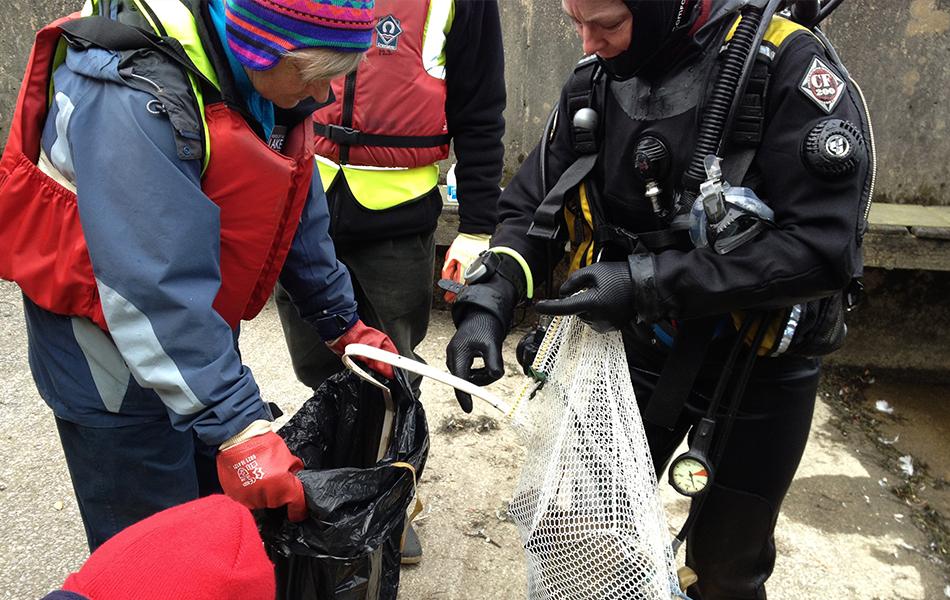
Kerry MacKay, SCUBA’s new environment columnist, is no stranger to beach cleans. Here she offers tips for cleaning up while underwater.
Just as any dive can be a Seasearch dive, any dive can also be a litter pick. Top tip for those of you who are Seasearchers – you can record the litter you find on the Seasearch form in the box that asks about litter and man-made objects.
You don’t need any fancy kit to do an underwater litter pick, though it does depend on what you find. A mesh goodie bag is a handy and versatile accessory. I have a medium one that rolls up neatly into my pocket. I have this with me on almost every dive, just in case.
Some items are just too big or risky to attempt to clean up
If fishing hooks are common where you dive, then you’d be wise to have something you can safely stick the hooks into for transport. An old wine cork on some string is a good and cheap option. Try to avoid anything plastic for your hook storage (plastic corks, foam, sponge…) because it will start to disintegrate and we don’t want to be adding more plastic to the oceans.
 When it comes to deciding if you should clean something up, I judge it by what material it’s made of and how much the item has become something’s home. If it’s a piece of untreated wood that will naturally degrade, then it can stay.
When it comes to deciding if you should clean something up, I judge it by what material it’s made of and how much the item has become something’s home. If it’s a piece of untreated wood that will naturally degrade, then it can stay.
Likewise, if the item has been thoroughly colonised by wildlife, leave it be. That’s a new artificial reef now.
If you find some larger litter, think carefully if it is safe to recover it. A dSMB can be useful for helping you recover heavier items, as can lift bags for even larger items if you’re suitably experienced.
You may need to take a careful mental/written note of where the item is located to return to at a later date. This can be a great way to give a future dive some purpose to get others engaged in the activity. Some items are just too big or risky to attempt to clean up in your club. Large fishing nets are a good example of this, sometimes found fouling our beloved wrecks.
You can report any large fishing gear you find to Ghost Fishing UK. They are a voluntary clean-up crew and train to safely recover such large and difficult items. You can join them as a volunteer if you are suitably qualified, and have the right kit and motivation.
Once back ashore, we need to ensure things are disposed of properly. Take photos of your haul and be sure to share your good work online (tag #BSACdivers as we love to see what you’ve been up to.)
If anything can be reused, just clean it and do so. You could have a sale of items to raise some money for your club or a charity. Fishing weights and lures are good for this. Similarly, give recyclable items a rinse or scrub as needed, and recycle them where possible. Dispose of the rest of your litter sensibly. No leaving unbagged encrusting life to stink the neighbourhood out until the next council collection date!
You probably already know sites you could clean up. If you’re looking for an easy win, try asking your local harbour or marina. Of course, be sure to get permission and agree on a time/area so as not to impede traffic. This could mean making an underwater litter pick a part of your club’s New Year dive, when the harbours are at their quietest.
The additional planning and permissions for these locations can be well worth the effort. Boaters are forever losing expensive things over the side, as well as the ubiquitous litter that follows wherever humans go. You never know what you could find. You could make a yachtie very happy by recovering something they dropped. Happy picking!
Article 'Underwater litter pick, anyone?' by Kerry MacKay first published in SCUBA magazine, Issue 138 September 2023.

 Author: Kerry MacKay | Posted 04 Oct 2023
Author: Kerry MacKay | Posted 04 Oct 2023



